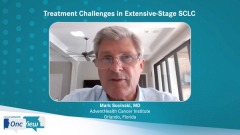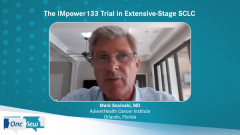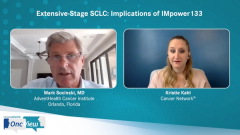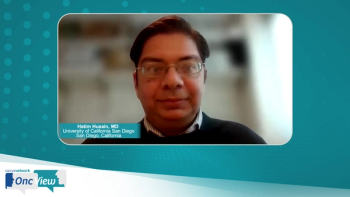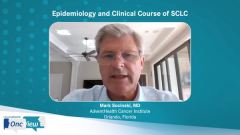
Extensive-Stage SCLC: Implications of IMpower133
Practical implications of the IMpower133 study for providers and patients.
Episodes in this series

Kristie Kahl: Dr Socinski, what are the overall implications of IMpower133 for clinical practice?
Mark Socinski, MD: IMpower133 was the first trial that really transitioned the standard of care to a new standard of care, and that was incorporation of atezolizumab with platinum-based therapy and also including maintenance therapy. We haven’t had any successful maintenance trials in small cell lung cancer. This trial did have maintenance atezolizumab in part of its design. This was the first positive trial, the first indication by the FDA. It changed the standard of care, practice, and expectations for patients with extensive-stage small cell lung cancer. We knew there was a significant number of patients who were going to receive benefit by the addition of atezolizumab, without really subjecting them to any significantly increased risk of toxicity shown in the IMpower133 trial.
Kristie Kahl: How will you incorporate atezolizumab into your treatment planning?
Mark Socinski, MD: It’s been my standard of care since the results of IMpower133 were released. I’ve been using it, and it’s been part of our pathway. As I mentioned, it’s part of the NCCN [National Comprehensive Cancer Network] Guidelines, so that’s been my go-to treatment since the initial approval a couple of years ago.
Kristie Kahl: Have you had experience with this regimen in your patients with extensive-stage small cell lung cancer? If so, what has your experience been?
Mark Socinski, MD: Yeah, it’s significant experience. We’ve used it in pretty much all the patients we’ve seen who don’t have a contraindication, which is not many patients. The incorporation of atezolizumab in this population has been relatively easy. I don’t see any excessive toxicity. Patients are accepting of it, patients like the idea of adding immunotherapy in this setting. As I mentioned, we haven’t had any surprises with regard to toxicity. The approval paved the way for practitioners to be using this on a routine basis, and that’s what we’ve been doing. It’s hard to know exactly the impact. But from the phase 3 data, I think our patients are benefiting and that this is the new standard of care in this setting.
Kristie Kahl: I know we talked about the clinical implications. What would you say are the implications of this approval for patients?
Mark Socinski, MD: To know that we can say that we have a better therapy. For years we’ve been stuck in the platinum-doublet-with-etoposide mode. Frankly, there’s nothing terribly exciting about that. It’s been difficult because patients hear about new, targeted therapies, immunotherapy, and they want that to be part of their treatment because they perceive it as being a positive thing. Initially, based on IMpower133, we could say to patients, yes, adding immunotherapy to your regimen offers you the chance of better overall outcomes.
Kristie Kahl: Looking ahead, what do you see happening in the future in terms of immunotherapy and small cell lung cancer?
Mark Socinski, MD: What I hope we can do is figure out who’s benefiting from the current approaches and who needs a different approach. What are the new approaches we need in patients who don’t seem to be benefiting as significantly as we would like them to, from the current standard of care? What are the new I/O [immuno-oncology] strategies coming along? Can we do better? We talked earlier about biomarkers. Can we do better at identifying patients who are going to get a great benefit from, in this case, an anti–PD-L1 drug? Also, we need to find those patients who might not be getting a great benefit in this setting. That’s what I’m hoping for the future, as well as just developing more active agents in this setting.
Kristie Kahl: Thank you so much. I hope that you found this information to be valuable for your clinical practice. Thank you all for watching CancerNetwork®’s OncView video series from MJH Studios™.
Transcript edited for clarity.
Newsletter
Stay up to date on recent advances in the multidisciplinary approach to cancer.



